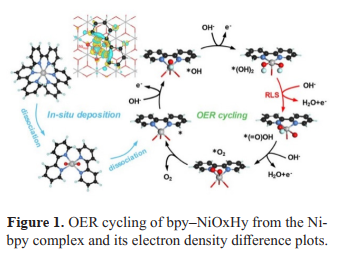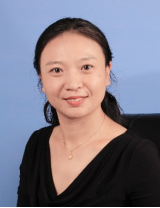Electronic Structures Tuning of Transition-Metal Compounds for
Electrocatalysis: Theoretical studies
Yanning Zhang*, Pai Wang, Chao Ma
Institute of Fundamental and Frontier Sciences, University of Electronic Science and Technology of China,
Chengdu, 611731, China
EXTENDED ABSTRACT: Electrolytic water splitting is of great significance in the preparation of clean energy. It has a critical importance to get a comprehensive and deep understandings of the electrocatalytic oxygen evolution mechanism, for the searching of stable and highly-efficient electrocatalysts. The multi-scale theoretical studies in our group have shown us that the spin-polarized magnetic moment might be used as a new descriptor of single-atom electrocatalysts. We report our recent studies on the crystal and electronic structures, electron transfer and spin polarization features of TM-N4@graphene[1] and Nickel pseudo-complex [2], so as to understand their individual OER mechanism. For example, it was observed in experiments that (bpy)zNiOxHy (bpy = 2,2′-bipyridine) catalyst exhibits the highest OER activity among Ni-based catalysts with a turnover frequency of 1.1s−1 at an overpotential of 0.30 volts, as well as a long-term stability in highly alkaline media at 1.0 mA cm−2 for over 200 h. Theoretical calculations show that the conjugated metal-ligand structure can induce more efficient electron transfer, changing the electronic features of active Ni atoms on surfaces and significantly improve its electrocatalytic OER performance (Fig. 1). In such a multi-dimensional and multi-scale research field, machine learning is a very powerful tool to have a quick search for high-performance catalysts. We have done preliminary work on this aspect, to provide ideas for the design of new TM-based electrocatalysts.

REFERENCES
[1] Y. Gao, C. Ma et al. Angew. Chem. Int. Ed., 60
(2021), 22513
[2] Peikun Zhang, Pai Wang et al., ACS Applied
Materials & Interfaces, 2021, in press

Yanning Zhang has completed her PhD from Shandong University in 2008 and postdoctoral studies from School of physics and astronomy, University of California, Irvine, USA in 2013. She is now a full professor at the University of Electronic Science and Technology of China. Dr. Yanning Zhang performs theoretical studies and predictions on the structural and physical properties of many functional materials. She has published more than 100 papers in reputed journals and has been serving as a member in the computational materials science branch of Chinese Materials Research Society